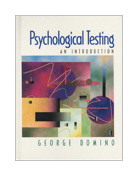|

PSYCHOLOGICAL TESTING AN INTRODUCTION
DOMINO G. wydawnictwo: PRENTICE HALL , rok wydania 2000, wydanie I cena netto: 237.00 Twoja cena 225,15 zł + 5% vat - dodaj do koszyka George
Domino , University of Arizona
Published
June 1999 by Humanities/Social Science
Copyright
2000, 657 pp. Cloth ISBN 0-13-020143-X
For
undergraduate/graduate-level courses in Psychological Testing in departments of
psychology, education, and business.
Unique in
both perspective and approach, this text exposes students to the entire panorama of
psychological testing-covering all major classic and contemporary topics without
going into overwhelming detail. Comprehensive-but not encyclopedic-and
cross-culturally relevant, it conveys in exceptionally clear language the excitement
associated with psychological testing, and teaches basic principles through concrete
interconnected examples. Focusing on "testing the individual" rather than on testing
in general and specific formulas, it is both academic and applied in
perspective-reflecting the author's varied experience in industry, in a counseling
center, and in other service oriented settings.
Focus
on testing the individual rather than testing in general.
Teaches
students to use tests as a tool in order to better understand an individual-whether that
person is a client in therapy, a college student seeking career or academic guidance, a
business executive wishing to capitalize on strengths and improve weaknesses, or a subject
in a scientific experiment.
Both
an academic and applied perspective throughout-Covers not only academic and research
applications of testing, but also the challenges and concerns found in a wide variety of
settings. Draws on the author's experiences and expertise as a clinical psychologist
working in an academic setting, as a management consultant, as Director of a Counseling
Center and as a participant in projects in fields such as nursing, rehabilitation,
medicine, and special education.
A
cross-cultural approach throughout-Includes discussion of cross-cultural testing in
detail in a separate chapter; integration of many examples of cross-cultural testing
applications; contains many tests from other countries, such as the British Ability Scales
and the D-48; and provides coverage of relevant concepts not usually covered in other
texts-e.g. acculturation scales and back-translation.
Broadens
students' horizons to other cultures, and gives each something to identify with. Provides
insight into cross-cultural issues, minority testing, testing bias, cultural diversity,
and related issues.
Explains
difficult concepts in easy-to-read, non-technical language, and uses a variety of
examples and illustrations.
Comprehensive-but
not encyclopedic coverage-Discusses major tests (e.g., the MMPI-2 and the Wechsler
tests), and tests that illustrate specific issues, principles, or applications, and
explores a full range of topics and issues-from the specific steps needed to construct a
test, to the scoring methods for biodata, to computer applications.
Exposes students
to the entire panorama of testing, but does not overwhelm them with detail. Allows instructors
to choose to enlarge on any topic or omit those of lesser interest, but all are
represented.
In
several optional discussions, goes beyond most other texts to provide important
details and insights, such as: exploration of the Vineland and the Peabody in
the context of special education-and detailed discussion of tests like the Boehm and the
Hiskey-Nebraska; coverage of tests to measure normal positive functioning-such as
sexuality, creativity, imagery and hope; discussion of the Beck Depression
Inventory-including its reliability and validity, short forms, floor effect, how
responses are affected by the test structure, etc.
Both
classical and current theories-Discusses the three classical types of validity, and
considers generalizability theory, decision theory, factor analysis, and individual
validity.
Current
topics covered in detail- Includes testing the elderly (full chapter); faking (full
chapter); computers and testing (full chapter); and the "Big Five" personality
dimensions.
A
chapter on the history of testing-Placed at the end of the text
(rather than at the beginning as in other texts).
Detailed
citations and suggested readings for each chapter.
Preface.
I.
BASIC ISSUES.
1. The
Nature of Tests.
2. Test Construction, Administration, and Interpretation.
3. Reliability and Validity.
II. DIMENSIONS OF TESTING.
4.
Personality.
5. Cognition.
6. Attitudes, Values, and Interests.
7. Psychopathology.
8. Normal Positive Functioning.
III. APPLICATIONS OF TESTING.
9.
Special Children.
10. Older Persons.
11. Testing in a Cross-Cultural Context.
12. Disability and Rehabilitation.
IV. THE SETTINGS.
13.
Testing in the Schools.
14. Occupational Settings.
15. Clinical and Forensic Settings.
V. CHALLENGES TO TESTING.
16. The
Issue of Faking.
17. The Role of Computers.
18. Testing Behavior and Environments.
19. The History of Psychological Testing.
Appendix: Table to Translate Difficulty Level of a Test Item into a z Score.
References.
Test
Index.
Index
of Acronyms.
Subject
Index.
Księgarnia nie działa. Nie odpowiadamy na pytania i nie realizujemy zamówien. Do odwolania !.
|


